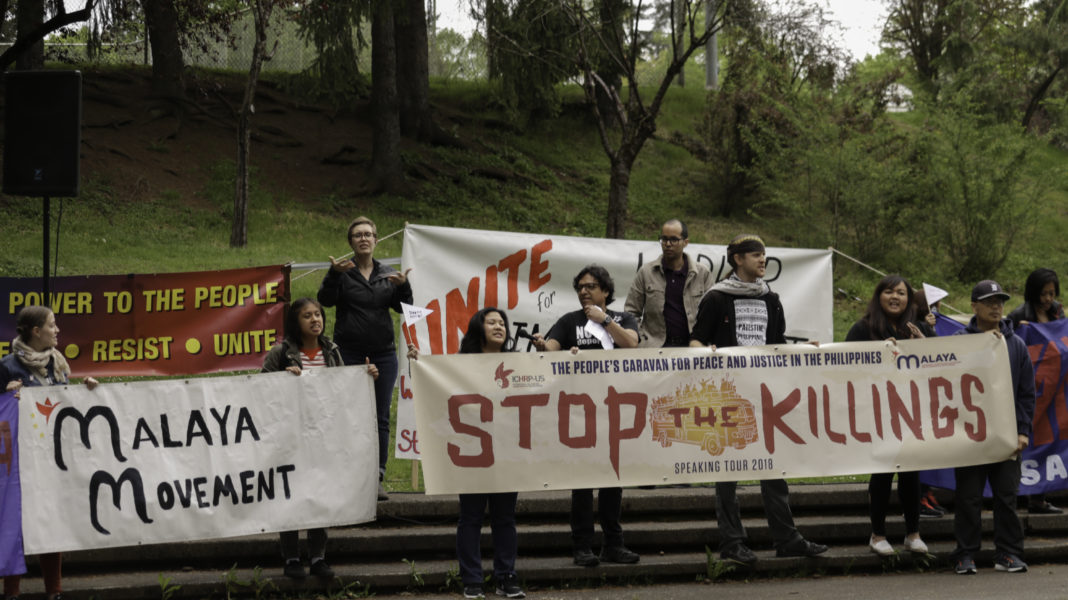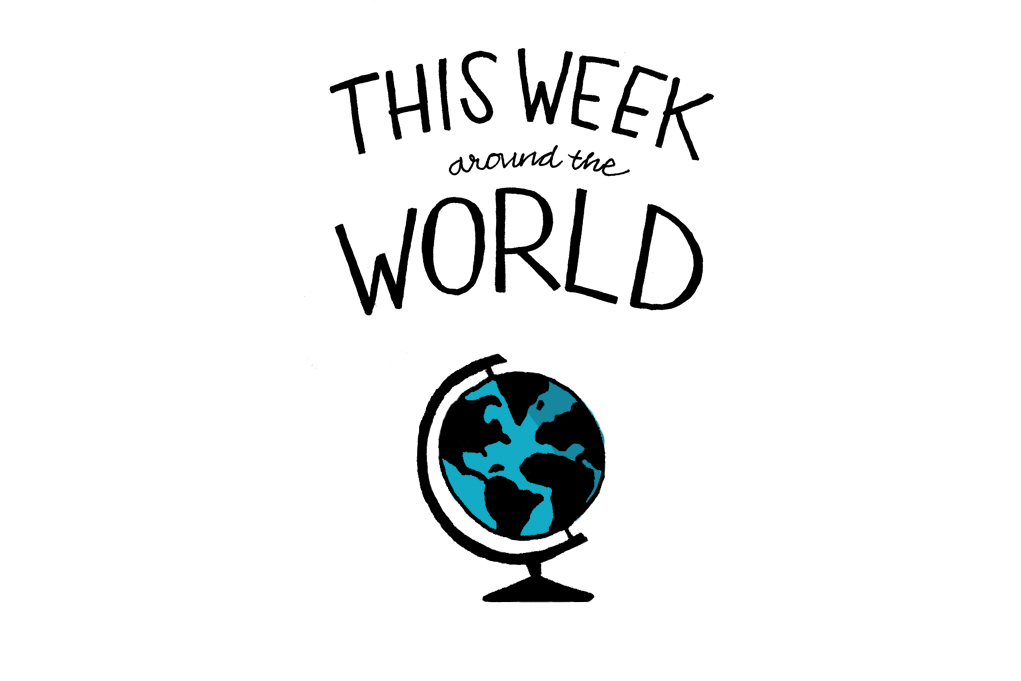This Week Around the World: 04/29-05/06
April 29 Bangladesh: A UN Security Council delegation spoke with Rohingya refugees as they visited camps in Bangladesh’s Cox’s Bazar district. During their visit, female refugees talked about their experiences, including rape and loss of family members, while hundreds of Rohingya staged a protest. Representatives from the camp gave the visiting delegation a list of demands, including repatriation and international security presence in Rakhine.
April 30 Kabul, Afghanistan: Two suicide bombings claimed by the Islamic State group hit Kabul, killing at least 29 people and injuring 49. The first attack took place during rush hour outside Afghanistan’s main intelligence agency. The second explosion took place about half an hour later by a suicide bomber posing as a reporter, targeting medical personnel and journalists responding to the first explosion. Nine journalists died and several others were wounded as a result of the second blast.
April 30 New York, U.S.: United States Judge George B. Daniels of the Southern District Court of New York has ordered Iran to pay $6 billion to victims and their families of the 9/11 attacks. Daniels issued a default judgement, despite the obvious complications that would ensue from Iranian representation in a U.S. courtroom. The 9/11 Commission has found no evidence of direct Iranian involvement in the attacks.
April 30–May 4 Israel: Israel’s national legislature The Knesset voted April 30 in favor of a bill giving the prime minister authority to declare war in extreme situations with the approval of the defense minister. On May 1, the Knesset also passed the first of three votes for Israel’s Jewish Nation-State bill, a section of which allows establishment of Jewish-only communities. On May 4, Israel formally withdrew its bid for a seat on the UN Security Council, allegedly due to its low chances of winning against Germany and Belgium.
May 1 Mubi, Nigeria: Twin suicide attacks rocked the northeastern town of Mubi, killing at least 24, though gravediggers reported burying 86 from the attack. The suicide attackers targeted a market and a mosque, making this the second mosque attack in six months. Boko Haram has not claimed responsibility, but according to Al Jazeera, they are believed to be behind the attacks.
May 1 Paris, France: May Day protests in Paris turned violent after the anarchist group Black Blocs hijacked the event. Approximately 1,200 rioters descended on what was intended to be a peaceful rally centering on labor reforms, smashing windows, torching cars and throwing Molotov cocktails. More than 100 rioters were arrested as a result.
May 1 Puerto Rico: Thousands came out to the streets for International Workers Day to protest the continued humanitarian crisis of the U.S. territory. Puerto Ricans protested the debt crisis, as well as the Trump administration’s failed response to the destruction caused by Hurricane Maria. About 1,000 police responded to the demonstrations, firing tear gas and rubber bullets while chasing participants away and arresting people in their homes without warrants.
May 2 Tripoli, Libya: An attack on an elections office in the capital city of Libya left 11 people dead and two injured. Two suicide bombers alongside armed men targeted the electoral commision headquarters while officials were registering voters for elections taking place later this year.
May 3 Iraq: Next week, Iraq will hold its first parliamentary elections since the government officially announced its defeat of the Islamic State group. Among those running is journalist Muntadhar al-Zaidi, who is most notable for throwing his shoes at then-President George W. Bush in 2008 during a press conference. Though he is regarded as a hero in Iraq, he spent nine months in prison after the incident, during which time he claims to have been tortured. Al-Zaidi is running on an anti-corruption campaign, though he has hopes to further his political career.
May 3 Saudi Arabia and Yemen: U.S. special forces were deployed to the border between Saudi Arabia and Yemen, allegedly in response to a Houthi missile which came close to Riyadh. The team will help locate and destroy caches of ballistic missiles, as well as Houthi missile sites. Meanwhile on the Yemeni island of Socotra located off the coast of Somalia, the UAE has occupied the territory with troops and military crafts.
May 3 The Philippines: The Philippine President Rodrigo Duterte has beckoned all Filipino workers in the Arab-Persian Gulf back to the country after the Philippine ambassador was expelled from Kuwait. Tensions have been rising between the two countries after a Filipina domestic worker was discovered in a freezer, having been murdered by her employers. Approximately 260,000 Filipinos reside in Kuwait. According to a 2015 UN report, almost 2 million reside in Saudi Arabia, the UAE and Qatar.
May 4 Washington, DC: The Trump administration rescinded the temporary protected status for Honduran migrants, ordering their departure by January 5, 2020, exactly 20 months from the date of the decision. Some 57,000 Hondurans reside in the U.S. with the protected status. The administration also withdrew funding for the Syrian White Helmets, stating U.S. financial support isn’t necessary at this point since the conflict is winding down. The White Helmets receive a third of their funding from the U.S. alone.
May 4 Egypt: As of May 4, Al Jazeera’s journalist Mahmoud Hussein has spent his 500th day in prison after being detained and questioned December 20, 2016. Hussein is an Egyptian national jailed on accusations of defamation and fraud; however, he was never formally charged with a crime.
May 5 Deir al-Balah, Gaza: Hamas blamed Israel for a blast in central Gaza that killed six of their members and injured three. The Israeli military denied all involvement in the blast. A Palestinian source reported to Haaretz a mishandling of explosives, and another source reported the blast occurred after attempting to defuse a dud which failed to explode in the 2014 Gaza War.
May 5 Hawaii: Around 1,700 residents have been ordered to evacuate after an eruption from the Kilauea volcano on Hawaii’s Big Island. Though the volcano has been erupting consistently since 1983, the Hawaii Fire Department reported extremely high levels of sulfur dioxide in the surrounding area. Lava has been spewing from fissure vents forming in neighborhoods and on streets, and hundreds of earthquake tremors have accompanied the eruption, the largest registering Friday at 6.9 magnitude.
When I first came to PSU, I was a Chinese major, having studied three years prior in high school alongside French and Japanese. After the first year, I took a hiatus. I don't believe in going to college straight out of high school, but it's what was expected. I returned a few years later to study Japanese at PCC and Arabic at PSU. I am now a junior majoring in International Studies: Middle East and Arabic. In the future, I would like to work as a journalist or humanitarian aid worker in the region, helping people who lack economic and political backing and media exposure.






